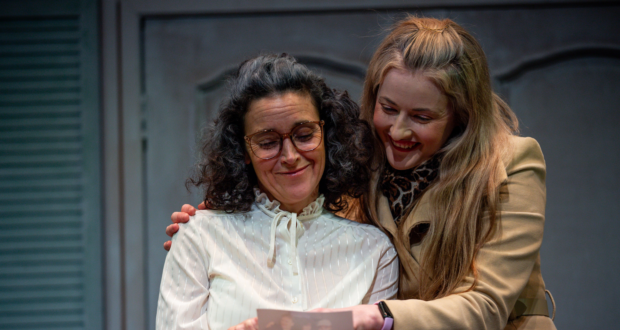A touching account of dementia in a family already affected by hearing loss, The Promise both celebrates the potential of the deaf community whilst demonstrating how far mainstream society has to go to effectively accommodate their needs.Summary
Rating
Good
Images of tree blossom floating away play on a screen at the back of the stage as the audience settle. Knowing one of the themes of this piece is dementia I thought this might signify a fractured mind disintegrating, although it turns out the reason for the image is considerably more obvious. Nonetheless there was a palpable sense of excitement amongst the audience as we gathered, most of whom were communicating enthusiastically using British Sign Language (BSL).
Rita (Anna Seymour) opens the action. A teacher, she is teaching her pupils Shakespeare’s Sonnet 18 which features the immortal lines “Shall I compare thee to a summer’s day … / rough winds do shake the darling buds of May” (that’ll be the floating blossom image then). More than a teacher who is deaf, she demonstrates how to sign the verse, and shows, quite forcefully, that she never speaks as she believes her ability to sign gracefully is more meaningful. She is passionate about ensuring deaf children have full access to all the educational resources they need to thrive in a modern world, and champions BSL as a language in its own right. Her son Jake (James Boyle) and her deceased husband Mike (Louis Neethling) are also deaf and the Deaf Club was a key part of the family’s social life.
A series of episodes follow featuring the family and Jane (Erin Hutching) an old family friend. With the exception of Seymour all actors play several roles to incorporate health care professionals and others. Set furniture is wheeled out as needed from behind a stylised wall designed to look like wall panelling.
Unfortunately, the writing is such that it is not always easy to understand which are events illustrating Rita’s deteriorating mental health or genuine episodes from the past. Some lack of attention to detail (such as a recent newspaper headline in a section that should have been from decades previously) further confuses. It is not until late in the play that we understand that Rita’s mental deterioration precipitates her retirement and that a relationship changing misunderstanding with her son was also for reasons relating to her illness. Personally, I love a non-linear narrative and am a great believer in the ability of an audience to fill in the gaps, but this has too many inconsistencies to work effectively.
This is a performance that has been constructed to celebrate and embrace those with hearing loss as well as illustrate the additional barriers they face in daily life. Much of the delivery is non-verbal, BSL is used constantly, as are displayed subtitles. With this in mind, both plot and delivery are very good. Reference is made to the 1978 Warnock report which had lasting detrimental effect for the educational needs of the deaf community and the inability of the hearing world to understand or accommodate those with hearing loss is demonstrated clearly, often to devastating effect. Sadly, the performances themselves are often lacking. Seymour, as Rita, is ineffectual. Her slide into confusion, fear and isolation is pedestrian. She neither fights it nor gets upset which feels unlikely. She also presents as far too young, even for the earlier versions of Rita. Similarly, Neethling often feels awkward, while Hutching inhabits one too many roles for the characterisation to be clear. Acting is as much about body as voice so this is disappointing. Boyle as Jake, by contrast, is very good and provokes a visceral and evolving emotional response from the audience throughout his story.
This is a performance that quite rightly champions non-verbal communication and accessibility. Sadly it does so at the cost of script and performance.
Written by: Paula Garfield and Melissa Mostyn
Set & Costume Design by: Paul Burgess
BSL direction by: David Sands
Directed by: Paula Garfield
The Promise plays at Lyric Hammersmith until 11 May. Further information and bookings can be found here.
 Everything Theatre Reviews, interviews and news for theatre lovers, London and beyond
Everything Theatre Reviews, interviews and news for theatre lovers, London and beyond



